vue组件的通讯方式
# vue组件的通讯方式一: Props
<template>
<div class="child">
<div>{{ msg }}</div>
</div>
</template>
<script>
export default {
props: {
msg: {
typpe: String,
},
},
}
</script>
# vue 组件的通讯方式二: $attrs
在
vue中可以使用$attrs来接收父组件传递的数据(一些自定义的数据的不会动态改变的数据 )
<template>
<div class="child">
<div>{{ $attrs.title }}</div>
</div>
</template>

# vue组件的通讯的方式三: $parent
在子组件中可以使用
$parent来获取的父组件中的数据
# 父组件
<script>
import Child from '@/components/Child.vue'
export default {
data() {
return {
parentData: '父组件的数据'
}
},
}
</script>
# 子组件
<script>
export default {
created() {
// 打印的结构为 父组件的数据
console.log(this.$parent.parentData)
},
}
</script>
# vue中组件通讯的方式四: $listeners
$listeners可以的获取到父级中methods中所定义的函数(不包含.native修饰的函数 ), 可以在子组件中的进行调用
# 父组件
<template>
<div class="home">
<Child @getData="getData" />
</div>
</template>
<script>
import Child from '@/components/Child.vue'
export default {
components: {
Child
},
methods: {
getData() {
return '$listeners'
}
}
}
</script>
# 子组件
<script>
export default {
created() {
const data = this.$listeners.getData();
},
}
</script>
# vue组件通讯的方式五: $emit
父组件在子组件上定义的自定义的事件, 在子组件中使用
$emit来调用的父组件定义的自定义事件, 并子组件中的数据传递给父组件
# 父组件
<template>
<div class="home">
<Child @getChildData="getChildData" />
</div>
</template>
<script>
// @ is an alias to /src
import Child from '@/components/Child.vue'
export default {
components: {
Child
},
methods: {
getChildData(value) {
console.log({
childData: value
})
}
}
}
</script>
# 子组件
<script>
export default {
data() {
return {
msg: "子组件中的msg",
};
},
created() {
this.$emit('getChildData', this.msg)
},
};
</script>
# vue的组件通讯方式的方式六: $refs
使用
ref给子组件定义一个别名, 然后使用$refs来获取子组件的实例, 就能够获取子组件的数据
# 父组件
<template>
<div class="home">
<Child ref="child1" />
<button @click="getChildData">获取的子组件的数据</button>
</div>
</template>
<script>
// @ is an alias to /src
import Child from "@/components/Child.vue";
export default {
components: {
Child,
},
methods: {
getChildData() {
console.log(this.$refs["child1"].msg);
},
},
};
</script>
# 子组件
<script>
export default {
data() {
return {
msg: "子组件中的msg",
};
},
};
</script>
# vue的组件通讯的方式七: $children
$children的方式跟的$refs来获取子组件的数据的使用方式基本上是一样的, 只不过this.$refs获取到的是一个对象, 而$children获取的到是一个数组
# vue的组件通讯方式八: provide,inject
provide和inject这对选项需要一起使用,以允许一个祖先组件向其所有子孙后代注入一个依赖,不论组件层次有多深,并在起上下游关系成立的时间里始终生效。
# 父组件
<template>
<div class="home">
<Child ref="child1" />
</div>
</template>
<script>
// @ is an alias to /src
import Child from "@/components/Child.vue";
export default {
name: "Home",
provide: {
foo: '我是的foo',
},
components: {
Child,
},
};
</script>
# 子组件
<template>
<div class="child">
{{ foo }}
</div>
</template>
<script>
export default {
inject: ["foo"],
};
</script>
 Long
Long
